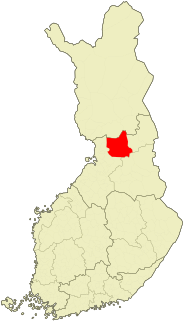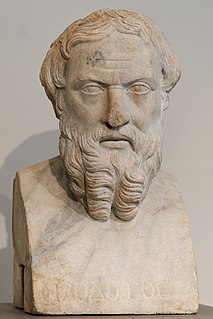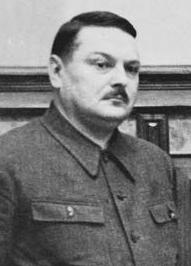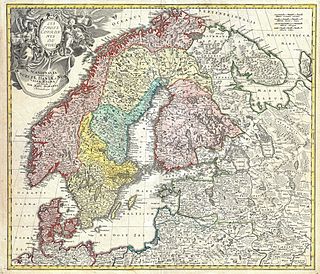
The history of Finland begins around 9,000 BC during the end of the last glacial period. Stone Age cultures were Kunda, Comb Ceramic, Corded Ware, Kiukainen, and Pöljä cultures. The Finnish Bronze Age started in approximately 1,500 BC and the Iron Age started in 500 BC and lasted until 1,300 AD. Finnish Iron Age cultures can be separated into Finnish proper, Tavastian, and Karelian cultures. The earliest written sources mentioning Finland start to appear from the 12th century onwards when the Catholic Church started to gain a foothold in Southwest Finland.

The Middle East is a transcontinental region centered on Western Asia, Turkey, and Egypt. Saudi Arabia is geographically the largest Middle Eastern nation while Bahrain is the smallest. The corresponding adjective is Middle Eastern and the derived noun is Middle Easterner. The term has come into wider usage as a replacement of the term Near East beginning in the early 20th century.

The history of Sweden starts when the Polar cap started receding. The first traces of human visitation is from ca 12000 BC.

The Eisenhower Doctrine was a policy enunciated by Dwight D. Eisenhower on January 5, 1957, within a "Special Message to the Congress on the Situation in the Middle East". Under the Eisenhower Doctrine, a Middle Eastern country could request American economic assistance or aid from U.S. military forces if it was being threatened by armed aggression. Eisenhower singled out the Soviet threat in his doctrine by authorizing the commitment of U.S. forces "to secure and protect the territorial integrity and political independence of such nations, requesting such aid against overt armed aggression from any nation controlled by international communism". The phrase "international communism" made the doctrine much broader than simply responding to Soviet military action. A danger that could be linked to communists of any nation could conceivably invoke the doctrine.
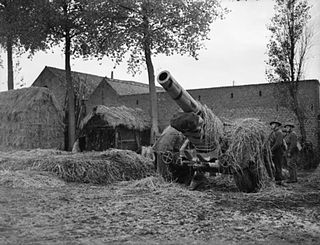
The Phoney War was an eight-month period at the start of World War II, during which there was only one limited military land operation on the Western Front, when French troops invaded Germany's Saar district. The Phoney period began with the declaration of war by the United Kingdom and France against Nazi Germany on 3 September 1939, and ended with the German attack on France and the Low Countries on 10 May 1940. While there was no large-scale military action by Britain and France, they did begin economic warfare, and shut down German surface raiders. They created elaborate plans for numerous large-scale operations designed to swiftly and decisively cripple the German war effort. These included opening a French-British front in the Balkans; invading Norway to seize control of Germany's main source of iron ore; and a strike against the Soviet Union, to cut off its supply of oil to Germany. Only the Norway plan came to fruition, and it was too little too late in April 1940.

The Aftermath of World War I saw drastic political, cultural, economic, and social change across Eurasia, Africa, and even in areas outside those that were directly involved. Four empires collapsed due to the war, old countries were abolished, new ones were formed, boundaries were redrawn, international organizations were established, and many new and old ideologies took a firm hold in people's minds.

The European theatre of World War II, also known as the Second European War, was a huge area of heavy fighting across Europe, from Germany's invasion of Poland on 1 September 1939 until the end of the war with the Soviet Union conquering most of Eastern Europe along with the German unconditional surrender on 8 May 1945. The Allied powers fought the Axis powers on two major fronts as well as in a massive air war and in the adjoining Mediterranean and Middle East theatre.

The Origins of the Cold War involved the breakdown of relations between the Soviet Union versus the United States, Great Britain and their allies in the years 1945–1949. From the American-British perspective, first came diplomatic confrontations stretching back decades, followed by the issue of political boundaries in Central Europe and political non-democratic control of the East by the Soviet Army. Then came economic issues and then the first major military confrontation, with a threat of a hot war, in the Berlin Blockade of 1948–1949. By 1949, the lines were sharply drawn and the Cold War was largely in place in Europe. Outside Europe, the starting points vary in the late 1940s or early 1950s.

Home to the Cradle of Civilization, the Middle East has seen many of the world's oldest cultures and civilizations. This history started from the earliest human settlements, continuing through several major pre- and post-Islamic Empires through to the nation-states of the Middle East today.

The Mediterranean and Middle East Theatre was a major theatre of operations during the Second World War. The vast size of the Mediterranean and Middle East theatre saw interconnected naval, land, and air campaigns fought for control of the Mediterranean, North Africa, the Horn of Africa, the Middle East and Southern Europe. The fighting in this theatre lasted from 10 June 1940, when Italy entered the war on the side of Nazi Germany, until 2 May 1945 when all Axis forces in Italy surrendered. However, fighting would continue in Greece – where British troops had been dispatched to aid the Greek government – during the early stages of the Greek Civil War.

The Anglo–Cherokee War, was also known from the Anglo-European perspective as the Cherokee War, the Cherokee Uprising, or the Cherokee Rebellion. The war was a conflict between British forces in North America and Cherokee Indian tribes during the French and Indian War. The British and the Cherokee had been allies at the start of the war, but each party had suspected the other of betrayals. Tensions between British-American settlers and the Cherokee increased during the 1750s, culminating in open hostilities in 1758.

Efraim Karsh is an Israeli–British historian, the founding director and emeritus professor of Middle East and Mediterranean Studies at King's College London. Since 2013, he serves as professor of Political Studies at Bar-Ilan University. He is also a principal research fellow and former director of the Middle East Forum, a Philadelphia-based think tank. He is a vocal critic of the New Historians, a group of Israeli scholars who have questioned the traditional Israeli narrative of the Arab–Israeli conflict.
Ian Steven Lustick is an American political scientist and specialist on the modern history and politics of the Middle East.
Michael M. Gunter is an authority on Kurds in Turkey and Iraq and has written seven books on the Kurdish struggle. He is a board member of the Center for Eurasian Studies (AVIM).
Simon Frederick Peter Halliday was an Irish writer and academic specialising in International Relations and the Middle East, with particular reference to the Cold War, Iran, and the Arabian peninsula.

Germany–United States relations, also referred to as German–American relations, refers to the bilateral relations between the Federal Republic of Germany and the United States of America. German–American relations are the historic relations between Germany and the United States at the official level, including diplomacy, alliances and warfare. The topic also includes economic relations such as trade and investments, demography and migration, and cultural and intellectual interchanges since the 1680s.
Donna Robinson Divine is Morningstar Family Professor in Jewish Studies and Professor of Government at Smith College. She holds a B.A. from Brandeis University, 1963, and a Ph.D. from Columbia University, 1971, in Political Science. Divine is interested in Comparative Politics, Middle East Politics, and Political Theory.
Glyn Stone is Professor of International History at the University of the West of England. He gained a BA (Honours) degree at the University of Lancaster in 1970, an MA History at the University of Sussex in 1971, and his PhD at London School of Economics and Political Science in 1986. He became a Fellow of the Royal Historical Society in 1995. He became a lecturer at Bristol Polytechnic, the precursor of UWE in 1972 and became Dean of the Faculty of Humanities in 2000 until its merger with Social Sciences and Languages in 2003.
The Aftermath of the Winter War covers historical events and comments after the Winter War between Finland and the Soviet Union from 30 November 1939 to 13 March 1940. The short period after the war and before the next, the Continuation War, is known as the Interim Peace.
The George Louis Beer Prize is a book prize awarded by the American Historical Association for the best book in European international history from 1895 to the present written by a United States citizen or permanent resident. The prize was created in 1923 to honor the memory of George Beer, a prominent historian, member of the U.S. delegation at the 1919 Paris Peace Conference and senior League of Nations official. Described by Jeffrey Herf, the 1998 laureate, as "the Academy Award" of book prizes for modern European historians. It is regarded as one of the most prestigious historical prizes offered in the United States, and it is usually awarded to senior scholars in the profession. This in contrary to the American Historical Association's other distinguished European history award, the Herbert Baxter Adams Prize, which is restricted to young authors publishing their first substantial work. Only four historians, Edward W. Bennett, Carole Fink, Piotr S. Wandycz and Gerhard Weinberg, have won the Beer Prize more than once in its ninety-year history.
